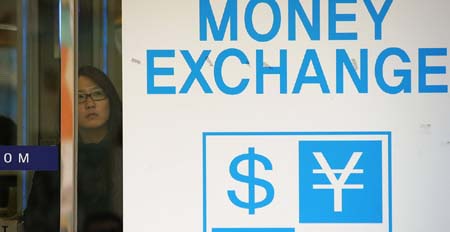Money
Asian currencies to rally on appreciation
By Weiyi Lim (China Daily)
Updated: 2010-04-16 10:10
 |
Large Medium Small |
|
 |
|
A woman inside a branch of the Korea Exchange Bank in Seoul. Asian currencies gained the most in two months on Wednesday. [China Daily] |
Chinese airlines, firms with lots of assets in Asia to benefit from yuan revaluation
TAIPEI: Asian currencies and Chinese airlines will likely rally once the yuan resumes its appreciation, said Mirae Asset Global Investments (HK) Ltd, a unit of the group that owns South Korea's biggest asset manager.
The region's currencies, led by the South Korean won, gained the most in two months on Wednesday amid speculation central banks will be more tolerant of appreciation as inflation accelerates and China may scrap the yuan's peg to the dollar.
| ||||
"Some stocks such as airlines, if they need to buy raw materials based in the US dollar and they have revenue in Asian currencies, will also benefit from a yuan rise," Sit said.
Singapore unexpectedly revalued its currency on Wednesday, triggering the biggest gain in a year, after the government raised forecasts for economic growth and inflation.
The South Korean won, which appreciated 1.1 percent on Wednesday, rose five times as fast as China's currency in the 12 months after the Chinese government last relaxed the foreign-exchange regime in July 2005, data compiled by Bloomberg show.
Twelve of 19 analysts surveyed by Bloomberg said China's central bank may allow the currency to float more freely this quarter, five expect it to happen by Sept 30, and the rest see the move by year-end.
Eleven ruled out a one-off revaluation, including State-owned Bank of China Ltd and China Construction Bank Corp. Fifteen predict a wider daily trading range.
A yuan revaluation will benefit economies seen as "more-direct export competitors to China", as their central banks become more tolerant of the rise of their own currencies without worrying about losing export competitiveness, Morgan Stanley said on Wednesday.
Sit expects any yuan appreciation to be "mild". The Chinese government isn't likely to adopt an aggressive monetary stance because it's "pro-growth by nature", he said.
Economic needs
China, which relies on manufacturers to help create jobs for 230 million migrant workers, will safeguard "its own economic and social development needs" when deciding exchange-rate policy, President Hu Jintao said in Washington on Monday.
Allowing the currency to strengthen would temper inflation after a 17 percent surge in import prices in March from a year earlier helped cause China's first trade deficit since 2004.
Speculation on when and how the yuan will begin appreciating escalated in the past week as US Treasury Secretary Timothy Geithner met Vice-Premier Wang Qishan in Beijing after delaying a decision on whether to label China a "currency manipulator".
China has pegged its currency at about 6.83 against the dollar since July 2008, after allowing it to rise 21 percent in the previous three years.
Rate outlook
"Companies that have a lot of assets in Asia will benefit," Sit said. "For example, those that own a lot of buildings or properties."
Any Chinese interest rate increases will be "benign" as the government doesn't want to hurt the long-term attractiveness of the stock market, Sit said. The People's Bank of China hasn't increased borrowing costs since 2007.
The Shanghai Composite Index has fallen 3.4 percent in 2010, making it the worst performer in Asia, on concern the government will tighten monetary policy to contain inflation.
The government has twice required banks to set aside a larger proportion of deposits as reserves this year after lenders advanced a record 9.59 trillion yuan ($1.41 trillion) in new loans in 2009.
People's Bank of China Governor Zhou Xiaochuan said in March that inflation was the biggest factor in any decision on interest rates.
Sit also likes companies that are driven by domestic demand and aren't dependent on exports including infrastructure stocks.
Mirae Asset Global Investments is a unit of Mirae Asset Financial Group.













